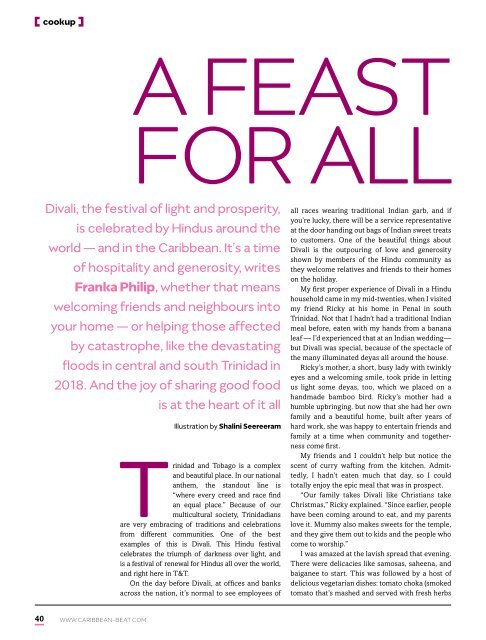Caribbean Beat — September/October 2019 (#159)
A calendar of events; music, film, and book reviews; travel features; people profiles, and much more.
A calendar of events; music, film, and book reviews; travel features; people profiles, and much more.
You also want an ePaper? Increase the reach of your titles
YUMPU automatically turns print PDFs into web optimized ePapers that Google loves.
cookup<br />
A feast<br />
for all<br />
Divali, the festival of light and prosperity,<br />
is celebrated by Hindus around the<br />
world <strong>—</strong> and in the <strong>Caribbean</strong>. It’s a time<br />
of hospitality and generosity, writes<br />
Franka Philip, whether that means<br />
welcoming friends and neighbours into<br />
your home <strong>—</strong> or helping those affected<br />
by catastrophe, like the devastating<br />
floods in central and south Trinidad in<br />
2018. And the joy of sharing good food<br />
is at the heart of it all<br />
Illustration by Shalini Seereeram<br />
Trinidad and Tobago is a complex<br />
and beautiful place. In our national<br />
anthem, the standout line is<br />
“where every creed and race find<br />
an equal place.” Because of our<br />
multicultural society, Trinidadians<br />
are very embracing of traditions and celebrations<br />
from different communities. One of the best<br />
examples of this is Divali. This Hindu festival<br />
celebrates the triumph of darkness over light, and<br />
is a festival of renewal for Hindus all over the world,<br />
and right here in T&T.<br />
On the day before Divali, at offices and banks<br />
across the nation, it’s normal to see employees of<br />
all races wearing traditional Indian garb, and if<br />
you’re lucky, there will be a service representative<br />
at the door handing out bags of Indian sweet treats<br />
to customers. One of the beautiful things about<br />
Divali is the outpouring of love and generosity<br />
shown by members of the Hindu community as<br />
they welcome relatives and friends to their homes<br />
on the holiday.<br />
My first proper experience of Divali in a Hindu<br />
household came in my mid-twenties, when I visited<br />
my friend Ricky at his home in Penal in south<br />
Trinidad. Not that I hadn’t had a traditional Indian<br />
meal before, eaten with my hands from a banana<br />
leaf <strong>—</strong> I’d experienced that at an Indian wedding<strong>—</strong><br />
but Divali was special, because of the spectacle of<br />
the many illuminated deyas all around the house.<br />
Ricky’s mother, a short, busy lady with twinkly<br />
eyes and a welcoming smile, took pride in letting<br />
us light some deyas, too, which we placed on a<br />
handmade bamboo bird. Ricky’s mother had a<br />
humble upbringing. but now that she had her own<br />
family and a beautiful home, built after years of<br />
hard work, she was happy to entertain friends and<br />
family at a time when community and togetherness<br />
come first.<br />
My friends and I couldn’t help but notice the<br />
scent of curry wafting from the kitchen. Admittedly,<br />
I hadn’t eaten much that day, so I could<br />
totally enjoy the epic meal that was in prospect.<br />
“Our family takes Divali like Christians take<br />
Christmas,” Ricky explained. “Since earlier, people<br />
have been coming around to eat, and my parents<br />
love it. Mummy also makes sweets for the temple,<br />
and they give them out to kids and the people who<br />
come to worship.”<br />
I was amazed at the lavish spread that evening.<br />
There were delicacies like samosas, saheena, and<br />
baiganee to start. This was followed by a host of<br />
delicious vegetarian dishes: tomato choka (smoked<br />
tomato that’s mashed and served with fresh herbs<br />
40 WWW.CARIBBEAN-BEAT.COM

















